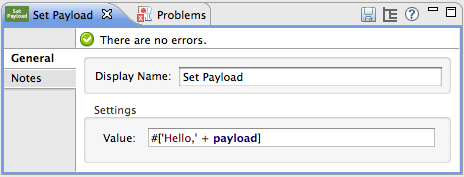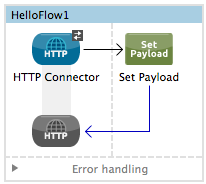
Set Payload Transformer Reference
| Mule Runtime Engine versions 3.5, 3.6, and 3.7 reached End of Life on or before January 25, 2020. For more information, contact your Customer Success Manager to determine how you can migrate to the latest Mule version. |
This transformer sets the payload to whatever you define. The payload can be a literal string or a Mule Expression.
Configuration in Studio Visual Editor

| Field | Value | Description | XML |
|---|---|---|---|
Display Name |
Set Payload |
Customize to display a unique name for the transformer in your application. |
|
Value |
String or Mule Expression |
Enter a literal string or a Mule expression that defines how Mule should set the payload. |
|
Configuration in XML Editor or Standalone
# Example setting a payload to a literal string.
<set-payload value="MyNewPayload" doc:name="Set Payload"/>
# Example setting a payload using a Mule expression. This takes the current payload and transformes it by adding the string "Hello, " in front of it. Thus, if your payload was "Charlie", this set-payload transformer changes it to "Hello, Charlie".
<set-payload value="#['Hello, ' + message.payload]" doc:name="Set Payload"/>| Element | Description |
|---|---|
set-payload |
Set a payload on your message (as shown in examples above). |
| Element Attribute | Description |
|---|---|
value |
The literal string or Mule expression that defines how Mule should set the payload. |
doc:name |
Customize to display a unique name for the transformer in your application. Note: Attribute not required in Mule Standalone configuration. |
Example in Studio Visual Editor
In this example, the Set Payload transformer sets the payload to a "Hello, World" message that includes today’s date (retrieved using a Mule expression.)


Example in XML Editor or Standalone
<?xml version="1.0" encoding="UTF-8"?>
<mule xmlns:http="http://www.mulesoft.org/schema/mule/http" xmlns="http://www.mulesoft.org/schema/mule/core" xmlns:doc="http://www.mulesoft.org/schema/mule/documentation" xmlns:spring="http://www.springframework.org/schema/beans" xmlns:xsi="http://www.w3.org/2001/XMLSchema-instance" xsi:schemaLocation="http://www.springframework.org/schema/beans http://www.springframework.org/schema/beans/spring-beans-current.xsd
http://www.mulesoft.org/schema/mule/core http://www.mulesoft.org/schema/mule/core/current/mule.xsd
http://www.mulesoft.org/schema/mule/http http://www.mulesoft.org/schema/mule/http/current/mule-http.xsd">
<flow name="HelloFlow1" doc:name="HelloFlow1">
<http:inbound-endpoint host="localhost" port="8081" path="/" />
<set-payload value="#['Hello, World!' + ' Today is ' + server.dateTime.format('dd/MM/yy')]" doc:name="Set Payload"/>
</flow>
</mule>


